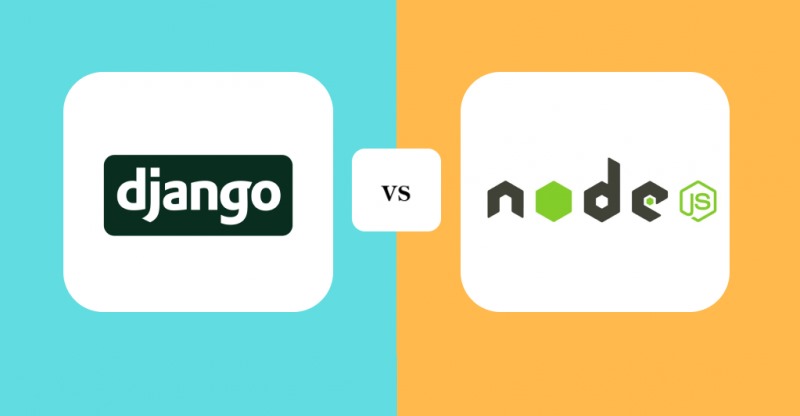Django vs NodeJS 2023
Django vs NodeJS 2023 Certainly, here’s a side-by-side comparison of Django and Node.js in a tabular format:
| Aspect | Django | Node.js |
| Language | Python | JavaScript |
| Architecture | MVT (Model-View-Template) | Flexible (commonly MVC) |
| Community & Ecosystem | Strong and active | Large and active |
| Scalability | Can scale but may require more effort | Known for handling many concurrent connections |
| Performance | Stable and performs well | Lightweight and can be highly performant |
| Learning Curve | Easier for beginners, opinionated | More flexible, variable learning curve |
| Use Cases | Content-heavy, data-driven applications | Real-time apps, APIs, SPAs, IoT |
| Development Speed | Rapid development with built-in features | Offers flexibility but may require more work |
| Built-in Features | Built-in admin panel, Django ORM | Fewer built-in features |
| Real-Time Applications | Requires additional libraries for real-time | Well-suited for real-time apps |
| Database Support | Excellent ORM support (Django ORM) | Various database options (e.g., MongoDB) |
| Popular Frameworks | Django Rest Framework | Express.js (for APIs), Socket.io (for real-time) |
| Template Engine | Built-in template engine (Django Templates) | Various template engines available |
| Deployment Options | Multiple hosting options | Flexible deployment options |
Django vs NodeJS 2023
Please note that the choice between Django and Node.js should be based on your project’s specific requirements and your team’s expertise. Both technologies have their own strengths and use cases, so consider which one aligns better with your development needs.
Django and Node.js are both popular technologies for web development, but they have different strengths, use cases, and ecosystems. Choosing between them depends on your project requirements, familiarity with the technology, and personal preferences. Let’s compare Django and Node.js in various aspects:
Django vs NodeJS 2023
Language:
Django: Django is a Python web framework. Python is known for its readability and ease of use.
Node.js: Node.js is not a language itself but a runtime environment for JavaScript. JavaScript is widely used for both front-end and back-end development.
Architecture:
Django: Django follows the Model-View-Controller (MVC) architectural pattern, but it’s often referred to as Model-View-Template (MVT) in Django terminology.
Node.js: Node.js allows developers to choose their own architecture. Common choices include the Express.js framework for creating RESTful APIs and the Model-View-Controller (MVC) pattern or a variation of it.
Community and Ecosystem:
Django: Django has a well-established and robust ecosystem with many third-party packages and libraries available through the Python Package Index (PyPI). It has a strong and active community.
Node.js: Node.js has a vibrant ecosystem with a vast number of packages available through npm (Node Package Manager). It has a large and active developer community.

Scalability:
Django: Django can handle high traffic and complex applications, but it may require more effort to scale horizontally.
Node.js: Node.js is known for its ability to handle a large number of concurrent connections due to its non-blocking, event-driven architecture. It can be well-suited for real-time applications.
Performance:
Django: Django is known for its stability and performance. It performs well for most web applications but may require more server resources for certain use cases.
Node.js: Node.js is lightweight and can be highly performant, especially for I/O-bound and real-time applications.
Learning Curve:
Django: Django provides a more opinionated framework with built-in features, which can make it easier for beginners but may limit flexibility.
Node.js: Node.js provides more flexibility, which can be both an advantage and a challenge for newcomers. The learning curve may vary depending on the chosen libraries and frameworks.

Use Cases:
Django: Django is commonly used for building content-heavy, data-driven applications, such as blogs, e-commerce websites, and enterprise applications.
Node.js: Node.js is well-suited for real-time applications, single-page applications (SPAs), and APIs. It’s often used for building scalable, high-traffic applications, chat applications, and IoT projects.
Development Speed:
Django: Django’s built-in features like the admin panel and the Django ORM can speed up development, making it a good choice for rapid development.
Node.js: Node.js offers flexibility but may require more development effort for certain features that are built into Django.
Django vs NodeJS 2023
In summary, the choice between Django and Node.js depends on your project’s specific requirements, your familiarity with the technology stack, and your team’s expertise. Both have their strengths, and either can be a good choice for web development depending on your needs.





